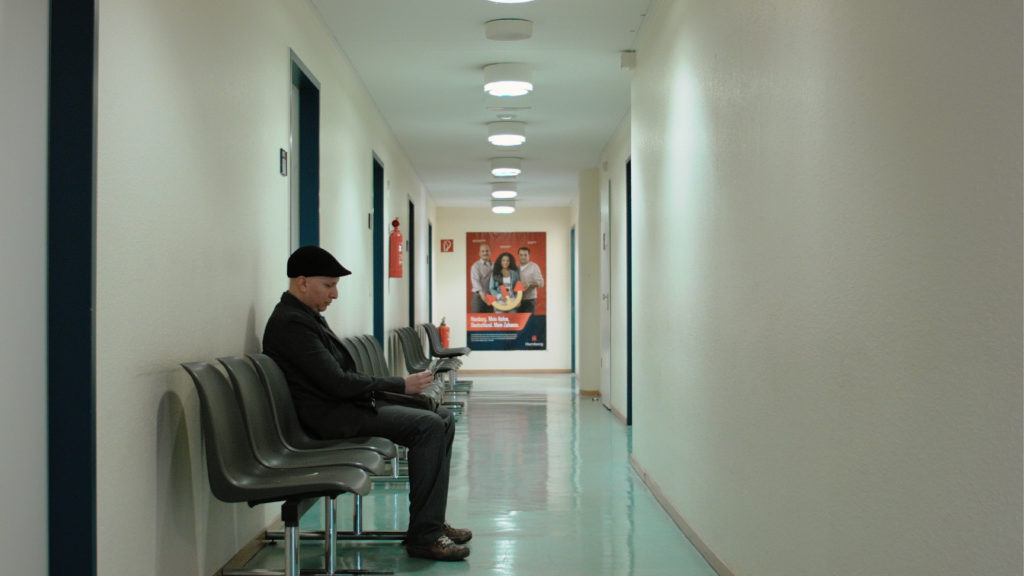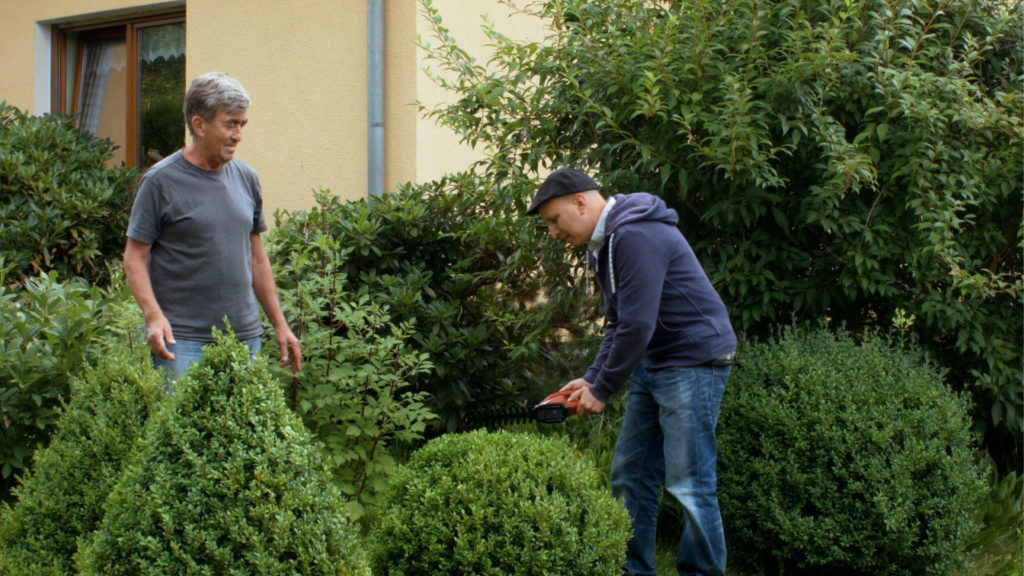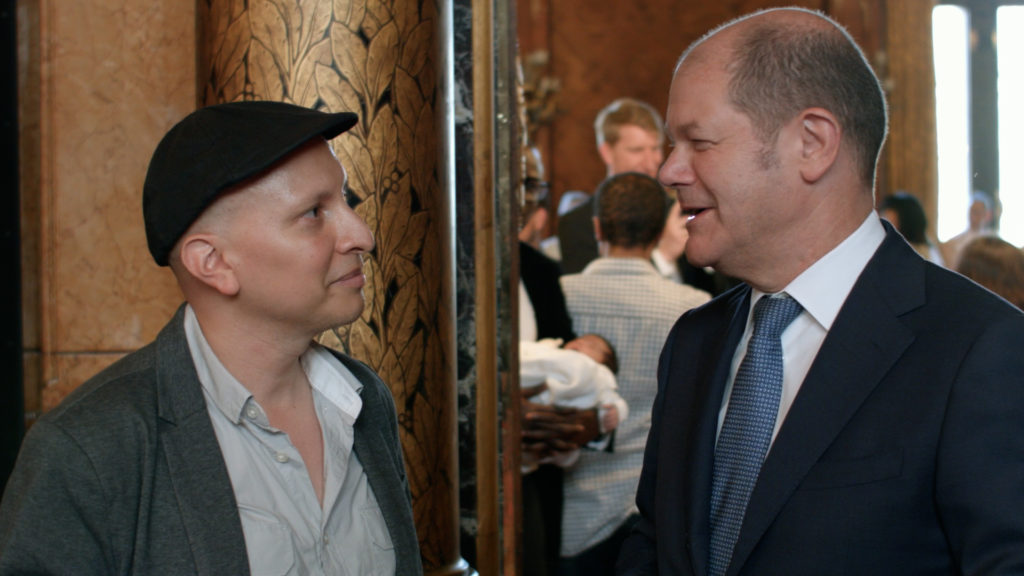Vita – Darío Aguirre
Darío Aguirre grew up in Ecuador where he worked as a painter, musician and performance artist. In 1999, he moved to Germany and studied Visual Communication & Media at the University of Fine Arts of Hamburg (HfbK) from 2001-2008. He received a scholarship from the Friedrich Ebert Foundation from 2004-2008. From 2004-2013 he organized the shortfilm festival “ambulart” in Germany, Ecuador and Mexico. He lives and works as a freelance author, editor and director in Hamburg.
Filmography
- Land of my children | Documentary | 88 min | 2018
- Cesars Grill | Documentary | 88 min | 2013 | Trailer…
- Five Ways to Darío | Documentary | 80 min | 2010 | Trailer…
- Lullaby for a returner | Documentary | 15 min | 2007 | Trailer…
- My last day as a fictive person | Documentary | 10 min | 2006 | Trailer…
“Land of my children” – Interview with Darío Aguirre
A letter inviting you to apply for a German citizenship sparked the idea for your latest film project „Land Of My Children“. What came first to your mind when you read the letter?
Dario Aguirre: I remember it like it was yesterday. My first reaction after opening the letter was a smile. But, at the same time, I also felt somewhat melancholic. It was a mixture of ‘At last!’ and realizing at the same time that the journey hadn’t been an easy one. And even though I am fully aware that my story is far less complicated than many others, the memory of how I started out struck me again and again. You can compare it to the situation where you get a diagnosis that will change your whole life. Such a drastic event makes people contemplate the past. I was thrilled to think back on what had happened in the past 15 years. So, it was not only an invitation to finally stay for good, but also an invitation to pause for a moment and take the time to reflect.
Did the letter come as a surprise?
DA: Totally unexpected. When you are used to the situation that your visa is always on the brink and has to be extended every two years and you never know if it will work out, you just stop thinking in the long term or making plans. In a way, one almost expects to be rejected. The danger is always there, but you get used to it over the course of 15 years. It was a great surprise, but, at the same time, I thought that there has to be a catch. If you have carried on in a bad relationship for years and suddenly your partner suggests to get married, you do question the reason why. It leaves a bittersweet taste. I decided to take a close look at this conflict and, of course, I was curious to find out how the naturalization process works. And there was still a chance that I might be refused the citizenship if I had not met all the requirements. Of course, I did everything in my power to make it work, but basically it was again only an application for a permanent residence permit for Germany.
What were the biggest challenges for you in the past few years and how have they affected your life?
DA: On the one hand, you experience a feeling of great uncertainty because you never know how long you can stay and subsequently can’t make any long-term plans. On the other hand, there are a lot of everyday requirements that you have to understand and take care of. I spoke very little German at first, so the language was the biggest obstacle for me. At the same time, I had to get used to the cultural differences. I was pretty rattled back then. I believe the most difficult part is that you have to reinvent yourself. You simply cannot go on like you did in your home country. You have to find a balance between the things you want to keep and the expectations you have to answer. I often had the feeling that I had to swim against the tide to reach my goals and that I had to struggle against myself. You have to let go of your ego to make room for new things. That’s why it was so interesting to me to take a closer look at my first year in Germany and to trace it back and talk about it. I experienced my start in Germany as a major break, one where you are not certain whether you can make it. Once you have found your place – and for me it was studying at the University of Fine Arts in Hamburg – you can start to evolve. Things become so much easier once the prospects are clear. You meet other people who have made similar experiences, and things get underway. The beginning is always the most difficult part because of the huge inner changes you have to make. So, talking about these experiences again and meeting the people who accompanied me back then – like, for example, my parents-in-law – was very important for me. I wanted to understand how they experienced the situation at the time because it always affects both sides. The cultural exchange depends on both perspectives and I absolutely wanted to have this aspect in my film. A successful coexistence can only work if both sides understand each other.
Was during filming actually the first time that you talked about your experiences?
DA: Yes, it was the first time after 15 years that we could honestly talk about it. Also, because now I can make myself understood much better. Back then, it was not possible. I could express myself emotionally for the first time and reach out to them quite differently.
Meanwhile, you live with your family in Hamburg, you work as a filmmaker and you have obviously mastered the balance we were talking about before. You seem to have “arrived”. How would you describe your relationship with Germany?
DA: Even though I have found my place and have many friends, I see a difference compared to my children because I have lived in another country and have memories of it. They will never disappear. The Ecuadorian part of me will never disappear. My children are growing up here, but maybe someday they will move in the opposite direction and go to Ecuador, who knows? But I will always lead a double life. I always know what’s happening back there and when people die, I realize how much of their life I’m missing. You experience important events only from the distance. For example, when I became a father: my father lives 8,700 miles away and I had to tell him via Skype about the birth of our children. At the same time, whenever I visit Ecuador, I am always very stressed during the first week and, after a month, I always want to go back to Germany. When I am there, I really have the feeling that Hamburg is the place where I belong. Actually, it is not even Hamburg, but rather my direct neighbourhood… I think a home is much smaller than a country. I cannot say that I am comfortable living in Germany. I don’t even know all of it – Altona is my district, we call it “barrio” in Spanish, and while in Ecuador I also felt at home in my barrio. I didn’t need any more.
Mariuxi Guevarra, a fellow Ecuadorian with whom you have already worked together in one of your short films, also appears in your film. Why did you include her?
DA: For me, the most interesting thing about Mariuxi is that she is constantly reflecting her experiences and is very interested in ethnology. We first met at the university and always had very good conversations about us feeling like strangers, but also about everyday issues like the extension of our visas. That’s very typical for foreigners and sometimes you have to laugh about it, too. But the subject always pops up. Often, the first question is: ‘So, what’s happening with your visa?’. She was one of the protagonists in my short documentary “My Last Day As A Probationary Person”. Mariuxi is, in a way, my alter ego. She also comes from Ecuador, has lived almost as long as myself in Germany, and we went down very similar paths. Except that she became a German citizen two years before me. She made the experience before me and I was hoping that she could give me some advise about how she felt afterwards. In a way, she is a vision of the future for me.
You always use animation in your documentary films to illustrate situations for which no film material exists. How do you plan these sequences?
DA: I didn’t have any film material for certain situations that I wanted to show. And, at the same time, since my memory of the events is slightly blurred and has become diffuse in the meantime, I didn’t want the images to be too clearly defined. By using rotoscope and drawings that were blurred and in pastel colours, we found a way to convey this feeling of a rather vague memory. It was very important for me that the animation serves a special function – in this case, of processing the past. It tells of the painful early days in Zittau, so the animated sequences concentrate on that special period. We worked together with the illustrator Victor Orozco. First of all, we filmed the scenes, then I edited them and, finally, Victor worked on them using the rotoscope technique. For me, the most important aspect was that the animation helps process certain events in the same way as I used to with my painting.
The animation seems also quite self-deprecating…
DA: That’s true, it had to convey a certain absurdity because it describes a condition somewhere between a recollection and a dream. For me, recollection and dream are related. You can also add new things to your recollection.
The camerawork is by Helena Wittmann – a fellow filmmaker who created very beautiful and precisely composed images for LAND OF MY CHILDREN. How did your collaboration come about?
DA: I have known Helena since university. But, back then, we did not work together. I especially liked her short film “The Wild”. The screenplay and the production design reminded me a lot of Zittau, and perhaps that’s what attracted me so much. Helena is a very good observer. She has the ability to treat spaces – just like people – as protagonists. For me, it’s very important that the surroundings are part of the production. And Helena proved with her own films that she sees it exactly like I do. She has a very strong sense of where the camera needs to be positioned in order to capture a situation in the best possible way. And, at the same time, it is a great pleasure to work with her. She makes everybody feel comfortable, which is truly a gift.
How long did you shoot the film?
DA: We worked with the team on and off over a period of three years. I did the camera myself for the more personal sequences like the conversations with my in-laws, but also at home with my wife Stephie. It’s because I wanted to reach an intimacy that would not be possible if sound and camera people would have been around.
You have decided to become a German citizen, but, at home, you are celebrating your own little Latin America…
DA: For us, it’s absolutely normal, but, from the outside, it might look unusual, although I do know quite a few people who cherish a much more Latin American lifestyle than we do. We speak Spanish at home and I still eat fried plantain for breakfast. We speak Spanish because Stephie and I got to know each other speaking Spanish. Language has a lot to do with emotions, and when you start out in one language, you stick to it because any other would sound artificial. We also speak Spanish with our kids. It’s wonderful to experience that our children are able to master so much more than we think. They speak Spanish and German and will learn other languages as well. I am not worried that they might not learn German properly, but think that they will speak a lot more languages apart from German. My German will not get any better, but the children are the future and they will overcome many of the fears that politicians put forward, like that one should speak German at home because otherwise the children won’t learn it properly. I believe that education depends on so many other things than just the mere process of learning. You can achieve much more with a child by being close and playing games. If the atmosphere is right, a child can achieve anything. My experience as a father gives me hope because my children are able to prise open my old habits and to surprise me time and again. And since they succeed in changing me, they can also do it in a greater social scale. They will also change things there and that is a very beautiful notion.












